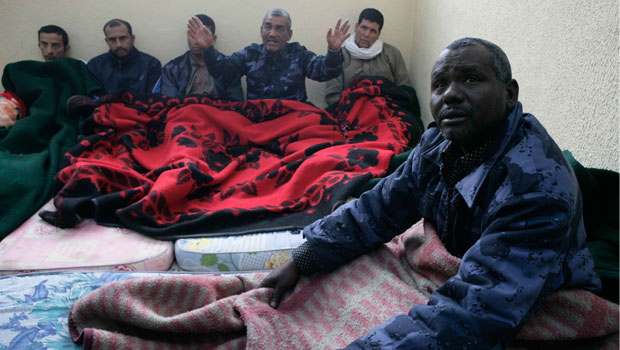They had reason to be. Anti-Qaddafi forces said they had captured the men in their successful fight for control of Benghazi, the country's second-largest city, where mercenaries are being blamed for killing scores of protesters. Outside the building, three effigies were hanging from lampposts and flagpoles — all depicting mercenaries.
"If people knew they were up there, they would tear down the door," said Atif El-Hasiya, a spokesman for the local organizing committee, which has taken control of the area after security forces were ousted.
How to handle the cases presents a sensitive challenge for the city's new leaders in the days after they threw off the long and punishing rule of Qaddafi. Mercenaries have become particularly hated and feared figures during the revolt, both for their brutality and because they represent Qaddafi's ability to buy protection for himself in lieu of gaining genuine loyalty.
Peter Bouckaert, Human Rights Watch's emergencies director, who is in Benghazi, said some of the men were from Chad, but "not mercenaries specifically recruited to defend Qaddafi but members of (a Chadian) rebel movement Qaddafi has been funding and training for many years who would lose that support if he fell."
It's also possible that African immigrants in the country for work or other reasons have been caught up in the sweeps targeting mercenaries as the young revolutionaries have seized control of several cities.
Many witnesses to the government's failed crackdown on protests described the government militia as including sub-Saharan Africans, and a brief visit with the accused mercenaries, included a group of detainees who seemed to be from farther south in Africa.
In one of the rooms, where seven dark-skinned men were being held, the prisoners spoke English with a distinctly African accent. "It is very dangerous here, we are innocent," shouted one man who did not give his name. "We cannot express ourselves, we are here with our wives. We are not bad people." All dressed in civilian clothes, the men described themselves as working in the area but didn't — and couldn't — give a greater accounting of themselves as local authorities, calling themselves prosecutors, yelled at them to be silent.
Thirteen Arabic-speaking men, who said they were from Libya, were being held in the other room. They, too, proclaimed their innocence. One, Mohammed Al-Damawi, said he was "born in Benghazi." Another said he was from the southern city of Sabha.
Yet another whispered that he was from Tunisia, where some of the mercenaries have been said to come from. But the man, Asad Moudib, insisted that wasn't the case. "I'm not a soldier," he said. "I was seized from the airport Saturday."










